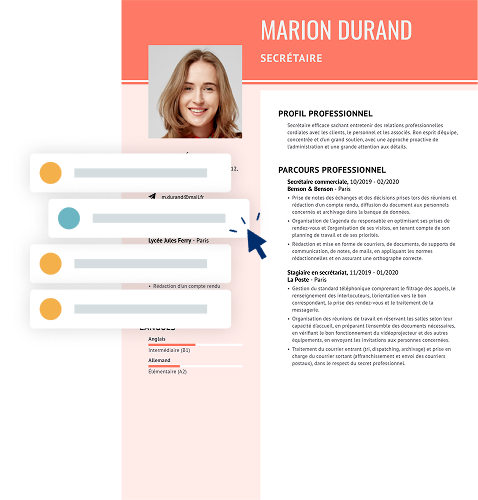Civil Service Behaviours: Framework, Examples & Questions
You’ve found a Civil Service job you’d love to apply for — but then you see the phrase “assessed against Civil Service Behaviours” in the job description. What does that mean, and how do you prove you’ve got them?
In this guide, we’ll break down the civil service behaviours framework, explain why it matters, and show you how to highlight these qualities in your CV and interview answers.


Our customers have been hired by: *Foot Note
What are civil service behaviours?

When you apply for a Civil Service role, you’re not only judged on your skills and experience. Recruiters also assess you against the Civil Service Behaviours framework, which outlines the values and actions expected from employees.
These behaviours demonstrate how you approach challenges, work with others, and deliver results. They’re designed to make hiring fairer and to ensure candidates are assessed on how they work, not just their qualifications.In practice, this means you need to show evidence of these behaviours in your CV, personal statement, and interview answers. If you can link your past achievements to the behaviours recruiters are looking for, you’ll instantly improve your chances of success.
The civil service behaviours framework & examples
The Civil Service assesses candidates against nine core behaviours. These behaviours describe the qualities and actions that employees are expected to demonstrate in their roles, from entry level through to senior leadership. Together, they form the foundation of how Civil Service staff work and contribute.
The nine civil service behaviours are:
- Seeing the Big Picture
Understanding how your role fits into the wider goals of your team, department, and government priorities. - Changing and Improving
Being open to feedback, finding better ways of doing things, and adapting quickly to new challenges. - Making Effective Decisions
Using evidence, data, and sound judgment to make choices that are fair, timely, and well thought out. - Leadership
Inspiring and motivating others, taking responsibility for outcomes, and setting a positive example. - Communicating and Influencing
Expressing ideas clearly, listening actively, and persuading others to achieve shared goals. - Working Together
Collaborating with colleagues, partners, and stakeholders to build trust and deliver results. - Developing Self and Others
Taking ownership of your own learning while supporting the growth and development of others. - Managing a Quality Service
Planning and delivering services that meet customer needs while making the best use of resources. - Delivering at Pace
Staying focused, organised, and resilient under pressure to meet deadlines and deliver results on time.
Each behaviour is assessed at different levels depending on the role. For example, Working Together at the entry level might involve supporting teammates, while at the leadership level, it could mean building cross-departmental partnerships.
Tip: Civil Service employers expect clear evidence of these behaviours in your CV, personal statement, and interview answers.
Civil service behaviours examples in a CV
To help you see how the behaviours framework works in practice, here’s an example CV tailored to a Civil Service application. It shows how you can highlight key behaviours like Working Together, Delivering at Pace, and Making Effective Decisions across various CV sections.
Amira Khan
12 Brookfield Avenue
Leeds, LS7 2QH
079 1122 3344
amira.khan@email.com
Professional Profile
Proactive Administrative Officer with four years of experience supporting policy delivery and frontline services within the Civil Service. Recognised for delivering high-quality outputs under pressure, building effective relationships with stakeholders, and identifying improvements to streamline services. Committed to the Civil Service values of integrity, honesty, objectivity, and impartiality. Currently seeking promotion to an Executive Officer (EO) role to contribute to service improvement and policy implementation.
Key Civil Service Behaviours
Seeing the Big Picture – Contributed to departmental strategy workshops, ensuring local delivery plans aligned with national policy objectives.
Making Effective Decisions – Analysed service usage data and presented evidence that supported the reallocation of £1.5M in resources to underfunded areas.
Communicating and Influencing – Drafted briefing packs and updates for senior officials, praised for clarity and accessibility, which improved decision-making speed.
Working Together – Collaborated with cross-regional teams to deliver a joint customer service initiative, improving satisfaction scores by 18%.
Delivering at Pace – Coordinated urgent responses to parliamentary questions, meeting all deadlines with 100% accuracy.
Work Experience
Administrative Officer
Department for Health and Social Care (DHSC), Leeds
September 2020 – Present
- Seeing the Big Picture: Supported the rollout of public health initiatives by aligning local delivery plans with government policy goals.
- Making Effective Decisions: Conducted data analysis on vaccination uptake rates and presented findings that informed ministerial briefings.
- Communicating and Influencing: Produced clear guidance documents for NHS partners, ensuring consistent communication across regions.
- Working Together: Collaborated with local authorities and healthcare providers to coordinate resources during winter pressure planning.
- Delivering at Pace: Managed multiple case files simultaneously, meeting strict deadlines under parliamentary scrutiny.
- Changing and Improving: Implemented a new digital filing system that cut processing times by 20%.
Casework Support Officer
HM Revenue & Customs (HMRC), Leeds
July 2018 – August 2020
- Making Effective Decisions: Reviewed complex case files and provided evidence-based recommendations to senior officers.
- Communicating and Influencing: Responded to customer queries with empathy and clarity, improving case resolution times.
- Working Together: Worked with compliance, legal, and finance teams to resolve disputes effectively.
- Managing a Quality Service: Supported the introduction of a new case-handling process that improved accuracy and consistency.
Education
BA (Hons) Politics and Social Policy
University of Leeds | Graduated: 2018
Relevant Modules: Public Policy Analysis, Governance, Social Research Methods
Additional Skills
- Data analysis (Excel, SPSS)
- Report writing and presentation
- Stakeholder engagement
- Project coordination
- Knowledge of GDPR and data security protocols
How to show civil service behaviours in your CV

Civil Service recruiters don’t just want to know what you’ve done — they want to see how you’ve done it. That’s where behaviours come in. Your CV should provide specific, evidence-based examples that match the behaviours listed in the job description. Here’s how to do it effectively:
1. Start with a behaviour-focused personal statement
Open your CV with a personal statement that highlights your strongest behaviours. This sets the tone right away.
Example:
“Proactive Administrative Officer with a record of delivering at pace and working collaboratively across departments. Skilled at producing clear, evidence-based reports to support senior decision-making and committed to upholding Civil Service values.”
2. Use a “Key Behaviours” section
Add a dedicated section under your profile that lists behaviours with proof. This makes them impossible to miss.
Example:
- Making Effective Decisions: Provided analysis that led to a £1.5M resource reallocation.
- Working Together: Coordinated a joint project with policy, finance, and legal teams.
- Delivering at Pace: Produced a 30-page consultation response in 48 hours.
3. Embed behaviours into work history
When describing your work history, don’t just list duties; instead, describe the responsibilities and key outcomes. Show achievements that reflect behaviours. You can even call out the specific behaviour in brackets.
Weak: “Responsible for preparing reports.”
Strong: “Prepared ministerial briefing papers (Communicating and Influencing) that shaped debate on national policy.”
4. Apply the STAR method in bullet points
Even though a CV should be concise, using the STAR method — Situation, Task, Action, Result — helps you turn ordinary responsibilities into clear achievements. The trick is to keep it short while still showing impact.
- Situation/Task: Briefly set the context.
- Action: Describe what you did.
- Result: Highlight the positive outcome, ideally with numbers or measurable change.
Example (weak): “Responsible for handling customer complaints.”
Example (STAR): “Resolved 20+ customer complaints per week (Situation/Task) by introducing a new logging process (Action), cutting response times by 30% (Result).
5. Tailor to the job advert
Not every role tests all nine behaviours. Focus on the ones listed in the advert and bring those to the top of your CV. For example, if Working Together and Delivering at Pace are highlighted, prioritise achievements that showcase collaboration and meeting deadlines.
6. Focus on impact, not tasks
Civil Service recruiters want to see outcomes. Replace passive duties with measurable results linked to behaviours.
Weak:“Attended team meetings.”
Strong:“Facilitated weekly cross-team meetings (Working Together) that improved project delivery times by 15%.”

Civil service behaviours interview questions: sample answers
Civil Service interviews often include behaviour-based questions. These test how you’ve demonstrated the nine behaviours in real situations. Below are examples of questions and strong answers that highlight the behaviours in action.
Tell me about a time you had to work closely with others to achieve a goal. (Working Together example)
In my role at the Department for Health and Social Care, I was part of a cross-regional team responding to winter pressures. I coordinated with local councils and NHS trusts to ensure resources were allocated fairly. By setting up weekly calls and sharing clear action plans, we avoided duplication and improved patient access to services. Feedback from senior management highlighted our collaboration as a model for other teams.
Give an example of when you had to make a difficult decision with limited information. (Making Effective Decisions example)
At HMRC, I reviewed several Universal Credit appeal cases where guidance was incomplete. I gathered input from colleagues, analysed what evidence was available, and made recommendations based on consistency and fairness. The decisions were upheld at review, which confirmed the approach was sound and helped build confidence in the team’s work.
Describe a time you influenced others to accept your idea or approach. (Communicating and Influencing example)
While supporting a new policy consultation, I noticed resistance from external stakeholders. I arranged a workshop to hear their concerns and reframed the proposal to highlight how it met their priorities. As a result, they backed the initiative, which was delivered on time. Senior leaders commended my ability to bring people on board and resolve conflicts constructively.
Tell me about when you had to deliver something under a very tight deadline. (Delivering at Pace example)
During my time as a Policy Support Officer, I was asked to prepare a 25-page consultation response in just 48 hours. I prioritised the most relevant evidence, delegated supporting tasks, and worked late to ensure accuracy. The document was submitted on time, praised for its clarity, and directly supported ministerial decision-making.
Give an example of how you improved a process or service. (Changing and Improving example)
In my department, I noticed delays in how case files were tracked. I proposed a new digital system, trained colleagues to use it, and monitored uptake. Within three months, average processing times dropped by 20%, freeing up staff for more complex tasks. The change is still in use and has since been rolled out to other teams.
Tell me about a time you had to lead or motivate others. (Leadership example)
During a cross-department project, I was asked to coordinate a small working group. I set clear roles, kept communication open, and recognised individual contributions. The project was delivered ahead of schedule, and feedback highlighted the positive team culture.
Tell me about a time you had to consider the wider impact of your work. (Seeing the Big Picture example)
While working at the Department for Transport, I was asked to prepare a report on regional infrastructure upgrades. Instead of focusing only on local improvements, I reviewed how the project aligned with national transport strategy and environmental commitments. By framing the report in terms of long-term economic growth and sustainability, senior leaders approved the plan and secured additional funding to expand the programme.
Describe a situation where you supported someone’s development. (Developing self and others)
A new colleague joined my team with little policy experience. I offered weekly guidance sessions, shared resources, and reviewed their drafts. Within three months, they were producing reports independently, and their confidence had grown significantly.
Give an example of how you maintained or improved service standards. (Managing a quality service)
I managed a busy inbox handling public enquiries. By introducing a tracking system and standard response templates, I reduced average response time by 30% while maintaining accuracy. Customer satisfaction feedback improved as a result.
Tip: Civil Service interviews often mix behaviour-based questions with more traditional ones like “What are your strengths?” or “Where do you see yourself in five years?” To make sure you’re ready check out our guide on common interview questions.
Tips for success in civil service applications

Applying for a Civil Service role is different from most jobs. Recruiters expect you to show how you work, not just what you’ve done. Here are some practical tips to help you succeed:
Tailor your CV to the behaviours listed
Every job advert highlights which behaviours will be assessed. Prioritise those in your CV and cover letter.
Use evidence, not vague statements
Avoid saying “I’m a good communicator.” Instead, write “Delivered clear reports that influenced ministerial policy decisions.” Evidence is what convinces recruiters.
Keep your CV concise and focused
Civil Service CVs are usually two pages maximum. Stick to achievements that link to behaviours and leave out irrelevant details.
Practice behaviour-based interview answers
Prepare examples from your past roles that demonstrate each behaviour. Think about situations where you collaborated, made decisions, or delivered under pressure.
Reflect Civil Service values
Alongside behaviours, recruiters look for honesty, integrity, objectivity, and impartiality. Show these through the way you describe your work and achievements.
Make the most of tools and templates
A well-structured CV makes it easier to highlight behaviours. Our CV templates are designed with the framework in mind, so you can present your experience clearly and professionally.

Andrew Smith
Senior Content Writer
Meet Andrew Smith – an accomplished English copywriter with a strong background in SEO optimisation. Passionate about producing engaging content, Andrew has written across various fields, including health and fitness, security, travel, and tourism.
*The names and logos of the companies referred to above are all trademarks of their respective holders. Unless specifically stated otherwise, such references are not intended to imply any affiliation or association with myperfectCV.










